-
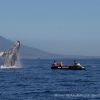 +24 +1
+24 +1Whale saved from entanglement after 285 feet of rope removed from mouth
An adult humpback whale is free after swimming in Maui waters entangled in rope. According to NOAA officials, the large whale was first reported entangled on Thursday by the captain of a fishing vessel. A trained response team soon deployed and used a small inflatable craft to approach the animal. Officials said the whale became "very active" upon their initial approach, so they waited for it to calm down before attempting to remove the braided rope.
-
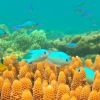 +26 +1
+26 +1Australia offers cash for Great Barrier Reef rescue ideas
Australia is calling on the world's top scientific minds to help save the Great Barrier Reef, offering hundreds of thousands of dollars to fund research into protecting the world's largest living structure. The UNESCO World Heritage-listed reef is reeling from significant coral bleaching due to warming sea temperatures linked to climate change.
-
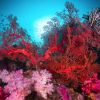 +4 +1
+4 +1Heartbroken scientists lament the likely loss of ‘most of the world’s coral reefs’
For decades, marine scientists have been warning of the demise of coral reefs in a warming world. But now, those warning calls have reached a full-scale alarm, leaving researchers at a loss for exactly how best to save the reefs. A study published Thursday in Science by some of the world’s top coral experts amounts to a last rites for the ecosystems often referred to as “the tropical rainforests of the sea.” Scientists surveyed 100 reefs around the world and found that extreme bleaching events that once occurred every 25 or 30 years now happen about every five or six years.
-
 +16 +1
+16 +1Vancouver Aquarium will no longer keep whales, dolphins in captivity
The Vancouver Aquarium is giving up its fight to keep whales and dolphins in captivity, saying the heated public debate on the issue is hindering its conservation work. Staff at the non-profit attraction learned Thursday morning of the decision to end the cetacean program, according to CEO John Nightingale. "We absolutely believe in the value of whales and dolphins in engaging people," he told CBC News.
-
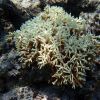 +23 +1
+23 +149% of Japan's largest coral reef has bleached: Environment Ministry
Some 49.9 percent of Sekisei coral reef -- Japan's largest -- had bleached by the end of 2017, the Environment Ministry has revealed. The figure is substantially less than the bleaching ratio of 91.4 percent on the reef between Okinawa Prefecture's Ishigaki and Iriomote islands at the end of 2016. However, "the water temperature remains high and the bleaching ratio is still high. We can't be optimistic," said an Environment Ministry official. "Coral in the area hasn't shown signs of real recovery, and remains in critical condition."
-
 +19 +1
+19 +1Belize bans oil activity to protect its barrier reef
Some good news for the new year: in what has been called a huge step forward in protecting oceans and marine life, the Belize government has announced bold legislation to end oil activity in all of its waters. The move is designed to protect the fragile Belize Barrier Reef world heritage site, the second-largest in the world after Australia’s and home to 1,400 species, including endangered hawksbill turtles, manatees, rays and six threatened species of shark.
-
 +18 +1
+18 +1Australia unveils reef protection plan
The Australian government has announced a A$60m (£34m; $48m) plan to help improve the health of the Great Barrier Reef. The reef suffered mass coral bleaching events in 2016 and 2017, which scientists said were a result of warmer ocean temperatures. It has also endured damage from crown-of-thorns starfish and cyclones. The new money, to be spent in four ways, will particularly target starfish and soil erosion.
-
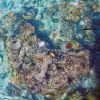 +17 +1
+17 +1Plastic Pollution Is Killing Coral Reefs, 4-Year Study Finds
Millions of tons of plastic waste end up in the ocean every year. And the trash stays there: Whether it's grocery bags or water bottles or kids' toys, plastic is practically indestructible. Now marine scientists have discovered that it's killing coral reefs. A new study based on four years of diving on 159 reefs in the Pacific shows that reefs in four countries — Australia, Thailand, Indonesia and Myanmar — are heavily contaminated with plastic. It clings to the coral, especially branching coral. And where it clings, it sickens or kills.
-
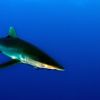 +13 +1
+13 +1Trump's Hatred Of Sharks Spikes Donations To Marine Conservation Charities
The alleged revelation of how Donald Trump has a not-so-secret loathing of sharks has inspired many to reach out and offer financial support for a number of international shark charities this past week, according to BBC News. The United States President's dislike for the animal was revealed last week during an In Touch Weekly interview where adult film actress Stormy Daniels detailed her relationship with Trump.
-
 +2 +1
+2 +1Fish poo could be the key in tackling reef's thorny problem
Fish poo could hold the answer to tackling the large numbers of crown-of-thorns starfish eating their way through the Great Barrier Reef. Researchers from the Australian Institute of Marine Science in Townsville have been collecting samples to try and identify fish which eat the native starfish.
-
 +24 +1
+24 +1New shark species discovered in the Atlantic Ocean had ancestors older than dinosaurs
Scientists have discovered a new species of shark which makes its home in the Atlantic Ocean. This particular family of the deep-sea predators was so elusive that it took scientists decades to identify that a new species exists in the Atlantic Ocean. The species belongs to the sixgill sharks family and has been named the Atlantic sixgill shark. Unlike the sixgill sharks residing in the Indian and Pacific oceans, who share similarities with each other, the Atlantic sixgill sharks are different, although the differences are not easy to spot for the naked eye.
-
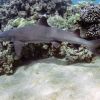 +15 +1
+15 +1Bill to protect sharks, rays moves to House
A bill that would protect sharks and expand protections to all rays within state waters is cruising through the state Legislature. Senate Bill 2079, co-introduced by Democratic Sens. Mike Gabbard of Oahu and Russell Ruderman of Puna and four co-sponsors, seeks to protect the animals for ecological purposes and their value to Native Hawaiian cultural practices and the ocean recreation industry.
-
 +19 +1
+19 +1New Underwater Vehicles to Study Ocean's Smallest Organisms
A small fleet of state-of-the-art research submersibles are scheduled to launch from Oʻahu tomorrow. The University of Hawaiʻi at Mānoa in partnership with the Monterey Bay Aquarium Research Institute will be using the underwater vehicles to track, study, and collect ocean microbes.
-
 +13 +1
+13 +1Cargo container lost off North Carolina coast had 5,900 pounds of sulfuric acid in it
One of the 76 cargo containers that fell into the Atlantic Ocean off the coast of Oregon Inlet, North Carolina, on March 3, had almost 6,000 pounds of sulfuric acid in it. The Coast Guard confirmed in a press release that A. P. Moller-Maersk reported that one of the containers missing from the cargo ship Maersk Shanghai held 5,900 pounds of sulfuric acid, and that there are no indications that this container has washed up on shore yet.
-
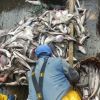 +22 +1
+22 +1Fishing Boats 'Going Dark' Raise Suspicion Of Illegal Catches, Report Says
A new report raises concerns that when fishing vessels "go dark" by switching off electronic tracking devices, in many cases they are doing so to mask the taking of illegal catches in protected marine parks and restricted national waters. In the report released Monday by Oceana, an international conservation group, authors Lacey Malarky and Beth Lowell document incidents of fishing vessels that disappear from computer screens as they shut off collision-avoidance beacons near restricted areas, only to have them reappear days or weeks later back in legal fishing grounds.
-
 +14 +1
+14 +1Microplastic pollution in oceans is far worse than feared, say scientists
The number of tiny plastic pieces polluting the world’s oceans is vastly greater than thought, new research indicates. The work reveals the highest microplastic pollution yet discovered anywhere in the world in a river near Manchester in the UK. It also shows that the major floods in the area in 2015-16 flushed more than 40bn pieces of microplastic into the sea. The surge of such a vast amount of microplastic from one small river catchment in a single event led the scientists to conclude that the current estimate for the number of particles in the ocean – five trillion – is a major underestimate.
-
 +2 +1
+2 +1Mysterious new ocean ‘twilight zone’ full of previously unknown fish discovered by scientists
Exploration of the "twilight zone” found in deeper regions surrounding Caribbean coral reefs has revealed numerous fish species previously unknown to science. The researchers documenting these new species were so impressed by the unique ecosystem they came across that they proposed a new name for it – the rariphotic zone. Located between 130 and 309 metres below the surface, the zone contains many fish that are related to species found on coral reefs and were not thought to occur at such depths.
-
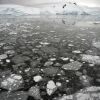 +15 +1
+15 +1Overfishing of Krill Is Disrupting Antarctic Food Chains
Krill oil, rich in heart-healthy omega-3 fatty acids, is a popular nutritional supplement around the world. However, according to a recent report from Greenpeace, growing demand is fueling commercial fishing in Antarctica's icy waters that could make it harder for all kinds of polar marine life to survive climate change threats.
-
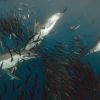 +21 +1
+21 +1Overfishing has turned Mediterranean dolphins into thieves
Dolphins short on prey are resorting to underhand tactics to find a meal – tearing into nets to access the fish inside. Researchers studying interactions between dolphins and fishermen in northern Cyprus found nets were six times more prone to damage when dolphins were in the vicinity. They concluded that the marauding marine mammals were therefore the most likely culprits.
-
 +25 +1
+25 +1Green-haired turtle that breathes through its genitals added to endangered list
It sports a green mohican, fleshy finger-like growths under its chin and can breathe through its genitals. The Mary river turtle is one of the most striking creatures on the planet, and it is also one of the most endangered. The 40cm long turtle, which is only found on the Mary river in Queensland, features in a new list of the most vulnerable reptile species compiled by the Zoological Society of London (ZSL).
Submit a link
Start a discussion




















